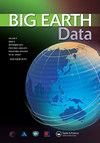Big data in support of the Sustainable Development Goals: a celebration of the establishment of the International Research Center of Big Data for Sustainable Development Goals (CBAS)
IF 3.8
3区 地球科学
Q1 COMPUTER SCIENCE, INFORMATION SYSTEMS
引用次数: 5
Abstract
In the last century the impacts of human activity on natural processes that sustain the Earth’s biosphere, atmosphere, hydrosphere and lithosphere and that provide the bedrock of human life support systems, have grown to the extent that they pose a credible existential threat to humanity. Today, the biggest challenge for science, technology and innovation (STI) is to contribute to the pursuit of global sustainability as exemplified in the Sustainable Development Goals (SDGs) that were adopted by the United Nations (UN) in 2015. Referred to as the 2030 Agenda for Sustainable Development, the SDGs comprise an ambitious, integrated framework of goals that represent humanity’s commitment to comprehensive and transformative action in response to the world’s most pressing social, economic, and environmental problems. In developing strategies for the successful achievement of the 2030 Agenda, the UN recognizes the importance of integrating scientific evidence in policy and decisionmaking processes. Through the Technology Facilitation Mechanism (TFM) and other means at its disposal, the UN encourages multi-stakeholder engagement and partnerships that can effectively mobilize and utilize STI to generate actionable knowledge and contribute practical solutions to global sustainability demands, problems, and challenges. One of the key aspects that the UN is focusing on is improving access to, and ensuring the quality of, reliable data sources. Doing so allows us to establish what situations, risks, and ongoing policies should be considered in order to correctly analyze data and develop effective strategies. The lack of a comprehensive implementation plan for the Global Indicator Framework for the Sustainable Development Goals and Targets, adopted by the UN in 2017 as a means of measuring and monitoring progress towards the SDGs, exposes the challenges and systems gaps in data collection. It points to a pressing need for the urgent identification of well-defined collection methods, which hitherto have prevented the successful implementation of the indicator framework. The International Science Council report “A Guide to SDG Interactions: from Science to Implementation” further stresses the importance of data as a driver for policy-making, by highlighting the need to observe and evaluate the dynamic interaction between different SDGs when formulating implementation policies through an integrated and trans-disciplinary scientific approach. Ensuring sustainable development therefore calls for innovative ideas utilizing new and multiple sources of data and information. This has been made possible by the rapid digitization of society in the past decades. Mass quantities of data on human activities and behaviors and on environmental changes – “Big Data” – have created enormous value and resulted in inventive services that enable the inclusion of digital concepts in a wide variety BIG EARTH DATA 2021, VOL. 5, NO. 3, 259–262 https://doi.org/10.1080/20964471.2021.1962621大数据助力可持续发展目标——庆祝可持续发展目标大数据国际研究中心成立
在上个世纪,人类活动对维持地球生物圈、大气、水圈和岩石圈以及为人类维持生命系统提供基石的自然过程的影响已经增长到对人类构成可信的生存威胁的程度。今天,科学、技术和创新面临的最大挑战是为实现联合国2015年通过的可持续发展目标(sdg)所体现的全球可持续性做出贡献。可持续发展目标被称为“2030年可持续发展议程”,它包含了一个雄心勃勃的综合目标框架,代表了人类致力于采取全面和变革性行动,以应对世界上最紧迫的社会、经济和环境问题。在制定成功实现《2030年议程》的战略时,联合国认识到将科学证据纳入政策和决策过程的重要性。通过技术促进机制及其掌握的其他手段,联合国鼓励多方利益攸关方参与和建立伙伴关系,有效调动和利用科技创新,产生可操作的知识,并为全球可持续性需求、问题和挑战提供切实可行的解决方案。联合国重点关注的一个关键方面是改善对可靠数据源的获取并确保其质量。这样做可以让我们确定应该考虑哪些情况、风险和正在进行的政策,以便正确分析数据并制定有效的策略。联合国于2017年通过了《可持续发展目标和具体目标全球指标框架》,作为衡量和监测可持续发展目标进展情况的手段,但由于缺乏全面的实施计划,数据收集方面的挑战和系统差距暴露无遗。报告指出,迫切需要确定明确的收集方法,这些方法迄今阻碍了指标框架的成功执行。国际科学理事会的报告《可持续发展目标相互作用指南:从科学到实施》进一步强调了数据作为决策驱动因素的重要性,强调在通过综合和跨学科的科学方法制定实施政策时,需要观察和评估不同可持续发展目标之间的动态相互作用。因此,确保可持续发展需要利用新的多种数据和信息来源的创新理念。过去几十年来,社会的快速数字化使这一切成为可能。关于人类活动和行为以及环境变化的大量数据(“大数据”)创造了巨大的价值,并带来了创造性的服务,使数字概念能够纳入各种各样的Big EARTH data 2021, VOL. 5, NO. 5。3,259 - 262 https://doi.org/10.1080/20964471.2021.1962621
本文章由计算机程序翻译,如有差异,请以英文原文为准。
求助全文
约1分钟内获得全文
求助全文
来源期刊

Big Earth Data
Earth and Planetary Sciences-Computers in Earth Sciences
CiteScore
7.40
自引率
10.00%
发文量
60
审稿时长
10 weeks
 求助内容:
求助内容: 应助结果提醒方式:
应助结果提醒方式:


